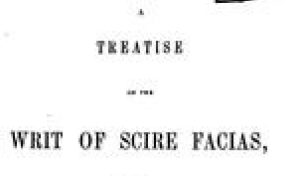 The writ of “scire facias” made one of its rare appearances in City of Dallas v. Ellis, after ten years passed from rendition of judgment, and the two-year grace period for a writ of scire facias expired as well. Unfortunately for the judgment debtor, under another provision of the Civil Practice & Remedies Code, the grace period does not expire for a judgment held by an incorporated city. The debtor did not persuade the Fifth Court that the city’s case should be viewed as one for subrogation that could potentially avoid that provision. No. 05-16-00348-CV (Feb. 17, 2017) (mem. op.)
The writ of “scire facias” made one of its rare appearances in City of Dallas v. Ellis, after ten years passed from rendition of judgment, and the two-year grace period for a writ of scire facias expired as well. Unfortunately for the judgment debtor, under another provision of the Civil Practice & Remedies Code, the grace period does not expire for a judgment held by an incorporated city. The debtor did not persuade the Fifth Court that the city’s case should be viewed as one for subrogation that could potentially avoid that provision. No. 05-16-00348-CV (Feb. 17, 2017) (mem. op.)
Monthly Archives: February 2017
In Baxter & Associates, LLC v. D&D Elevators, Inc., No. 05-16-003300-CV (Feb. 15, 2017), the plaintiff appealed from the denial of a temporary injunction against former employees and the company they formed. The plaintiff alleged that the former employees took trade secrets, namely a list of builders with projects potentially including elevators, in violation of their fiduciary duties and the Texas Uniform Trade Secrets Act (“TUTSA”).
After a two-day hearing, the parties received a signed order denying the request for temporary injunction, which was attached to an email from the court administrator stating, “The Court makes the following rulings: … I do find that trade secret as to existing jobs or bids was obtained… [but] there is an adequate remedy at law….” The plaintiff requested findings of fact and conclusions of law, and filed a motion for reconsideration based on its argument that it did not need to show no adequate remedy at law under TUTSA to obtain injunctive relief. The trial court did not sign any findings of fact or conclusions of law, and the plaintiff appealed without filing a notice of past due findings and conclusions of law.
The first issue addressed by the court was procedural—whether the statement contained in the court administrator’s email stating the existence of trade secrets was a finding of fact. The Court of Appeals held it was not, in part because at a subsequent hearing the trial court stated that it had not made such a finding. Although the plaintiff formally requested findings of fact and conclusions of law, it failed to file a notice of past due findings and conclusions of law pursuant to Rule 297. Thus, the Court of Appeals held there were no findings of fact or conclusions of law, that any error for the failure to make such findings was not preserved, and implied a finding that the plaintiff had not shown the existence of a trade secret.
The Court went on to hold that there was evidence that would have allowed the trial court to conclude that the list of projects was not a trade secret because the information could be publicly identified, and therefore would not “derive[] independent economic value, actual or potential, from not being generally known….”
Baxter & Associates, LLC v. D&D Elevators, Inc., No. 05-16-003300-CV (Feb. 15, 2017)
 vRide, a vanpool service, sought statutory indemnity from Ford after an accident, contending that the plaintiffs alleged – in substance – a products liability claim. The Fifth Court disagreed: The Cernoseks’ petition did not allege that the Ford van was unreasonably dangerous, was defective by manufacture or design, was rendered defective because it lacked certain safety features, or was otherwise defective. Instead, the petition alleged that vRide represented its vehicles had certain safety features when in actuality the vehicles did not have those safety features and that vRide failed to furnish vehicles with those safety features. In short, the Cernoseks’ petition did not contain allegations that the damages arose out of personal injury, death, or property damage allegedly caused by a defective product.” vRide v. Ford, No. 05-15-01377-CV (Feb. 2, 2017) (mem. op.)
vRide, a vanpool service, sought statutory indemnity from Ford after an accident, contending that the plaintiffs alleged – in substance – a products liability claim. The Fifth Court disagreed: The Cernoseks’ petition did not allege that the Ford van was unreasonably dangerous, was defective by manufacture or design, was rendered defective because it lacked certain safety features, or was otherwise defective. Instead, the petition alleged that vRide represented its vehicles had certain safety features when in actuality the vehicles did not have those safety features and that vRide failed to furnish vehicles with those safety features. In short, the Cernoseks’ petition did not contain allegations that the damages arose out of personal injury, death, or property damage allegedly caused by a defective product.” vRide v. Ford, No. 05-15-01377-CV (Feb. 2, 2017) (mem. op.)
 The dispute that rolled into court in Wheel Technologies v. Gonzalez was whether a shipment of wheels had been delivered. The companies’ records were important but not dispositive, as the Fifth Court rounded up the facts: “This case essentially came down to a ‘he said, he said’ between two parties’ explanations of accounting. Blaser testified WTI always created a purchase order when it received a delivery and because WTI had no record of any outstanding purchase orders owed to Gonzalez, then it never received the tires. Gonzalez testified to the contrary. . . . Further, Blaser admitted he could not say for sure Owens always created a purchase order upon receipt of tires because Blaser was never personally involved in any of the transactions. Rather, Gonzalez testified there were many times in which the deliveries occurred after hours so checks and other documentation were not always ready when he made a delivery.” No. 05-16-00068-CV (Feb. 8, 2017) (mem. op.)
The dispute that rolled into court in Wheel Technologies v. Gonzalez was whether a shipment of wheels had been delivered. The companies’ records were important but not dispositive, as the Fifth Court rounded up the facts: “This case essentially came down to a ‘he said, he said’ between two parties’ explanations of accounting. Blaser testified WTI always created a purchase order when it received a delivery and because WTI had no record of any outstanding purchase orders owed to Gonzalez, then it never received the tires. Gonzalez testified to the contrary. . . . Further, Blaser admitted he could not say for sure Owens always created a purchase order upon receipt of tires because Blaser was never personally involved in any of the transactions. Rather, Gonzalez testified there were many times in which the deliveries occurred after hours so checks and other documentation were not always ready when he made a delivery.” No. 05-16-00068-CV (Feb. 8, 2017) (mem. op.)
